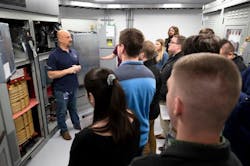Eaton is Training the Power Industry of the Future
While the future of the power industry may be bright, it’s facing a large labor shortage.
“We are seeing many of our colleagues retire and our customers are telling us the same thing,” said Jeff Krakowiak, senior vice president of marketing and commercial operations-- Electrical Sector at Eaton Corp. “This skills shortage is going to be with us for awhile so we have made a strategic decision to invest in long-term training for the industry’s future workforce.”
Eaton, a manufacturer of electrical systems for electrical, hydraulic and mechanical power employing 100,000 with revenue of $21.6 billion, has chosen to take the macroeconomic view of the situation.
"Electrical power is at the heart of what makes our homes, businesses and infrastructure work,” said Krakowiak. “Yet, there are not enough people with the specialized training needed to support the power industry into the future.”
To secure that needed talent, Eaton has both internal and external programs. The company collaborates with universities, community colleges, unions -- such as the International Brotherhood of Electrical Workers -- and associations such as the Independent Electrical Contractors.
The company has a long-standing collaboration with the University of Pittsburgh. “We are especially proud of being part of the university’s hand-on Electric Power Systems training facility,” says Krakowiak. The lab provides opportunities for faculty and graduate students to perform advanced work in the areas of AC and DC microgrids, smart grid technologies, power electronic devices and converters, renewable energy systems and integration, controls and communications, automation and relaying, distribution engineering, and other emerging electric power technology areas. The laboratory also integrates new course developments in electric power engineering, focused on these same emerging technologies.
Another recent joint effort with the University of Pittsburgh is the Energy Innovation Center (EIC). Developed by Pittsburgh Gateways Corp. the EIC is designed to engage corporate and community leaders, align workforce development and education, develop and demonstrate technology, and incubate businesses to support emerging clean and sustainable energy markets.
Eaton also collaborates with San Jacinto College in Houston. For nearly 60 years, the college has trained Houston’s oil and gas students and professionals. Its four campuses throughout East Harris County serve as training hubs to the largest petrochemical manufacturing region in the United States. And Eaton is supporting the new Center for Petrochemical, Energy and Technology which houses electrical training labs and glycol application area.
“To build the premier petrochemical training center along the Gulf Coast requires a great amount of support from industry, and Eaton has stepped in toe facilitate as an extended team to ensure that we have the right facility to fill the workforce gaps and keep our region’s competitive edge,” said Jim Griffin, senior vice president of petrochemicals and energy, San Jacinto College, in a statement.
This lab in combination with the lab in Pittsburgh has trained around 16,000 people.
From an internal perspective, the company is focused on upskilling its current workers. A targeted training program, called Power Up, helps early and mid-career professionals keep pace with codes and technology advancement. The two-day seminar guides professionals through a variety of electrical design characteristics, including power quality, power system design and system protection and coordination. Trainings are hosted at local manufacturing facilities around the United States and at Eaton Experience Centers.
At the Experience Centers, courses are offered which range from one-day classes to five-week programs The center offers full-scale demonstrations where students, instructors and industry professionals can see firsthand the latest advances in electrical power quality, energy management and safety. Fully controlled environments enable visitors to observe product testing and participate in live demonstrations. These centers are open to students, those new to the workforce and experienced power professionals alike.
While busy training those currently in the field and those at the university level as well, the company is also reaching out to students at earlier grade levels. The company has a number of STEM programs they support and on this past Manufacturing Day, they joined forces with a group called Her Spark to tour the company’s Raleigh plant. Her Spark’s mission is to equip girls with the STEM skills and opportunities to help solve the gender disparity in computer science, engineering and technology careers.
“Our goal is to provide curriculum development for people who want to be in this industry,” says Krakowiak. "The more we can train the future generation to understand our industry the better equipped the industry will be to face the challenges of the future.”
